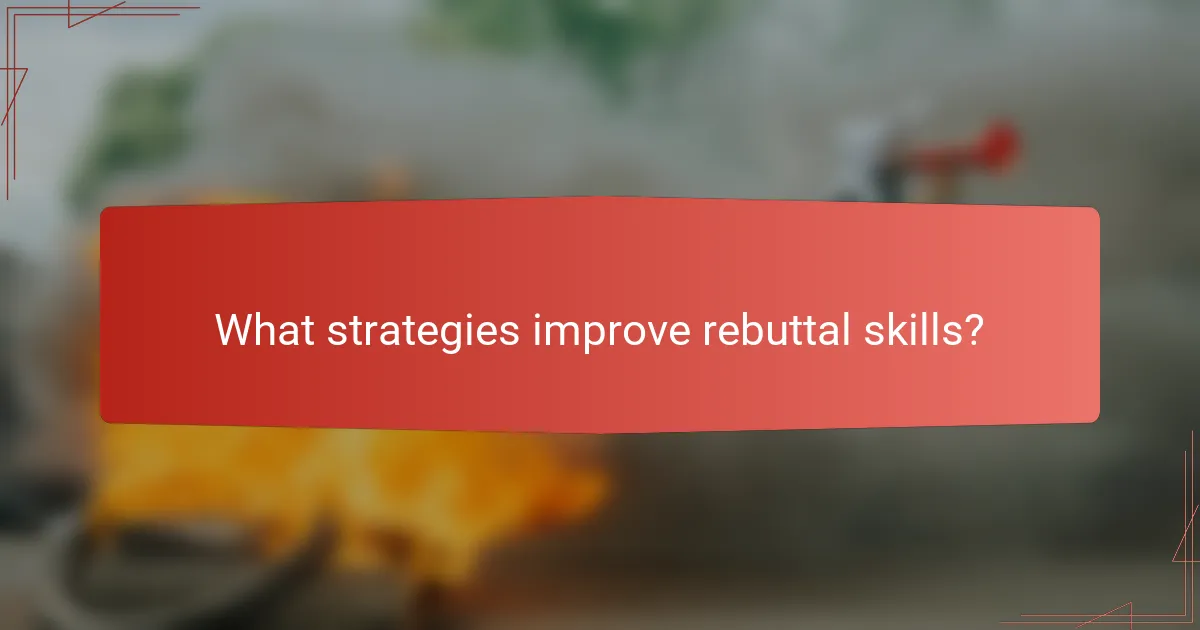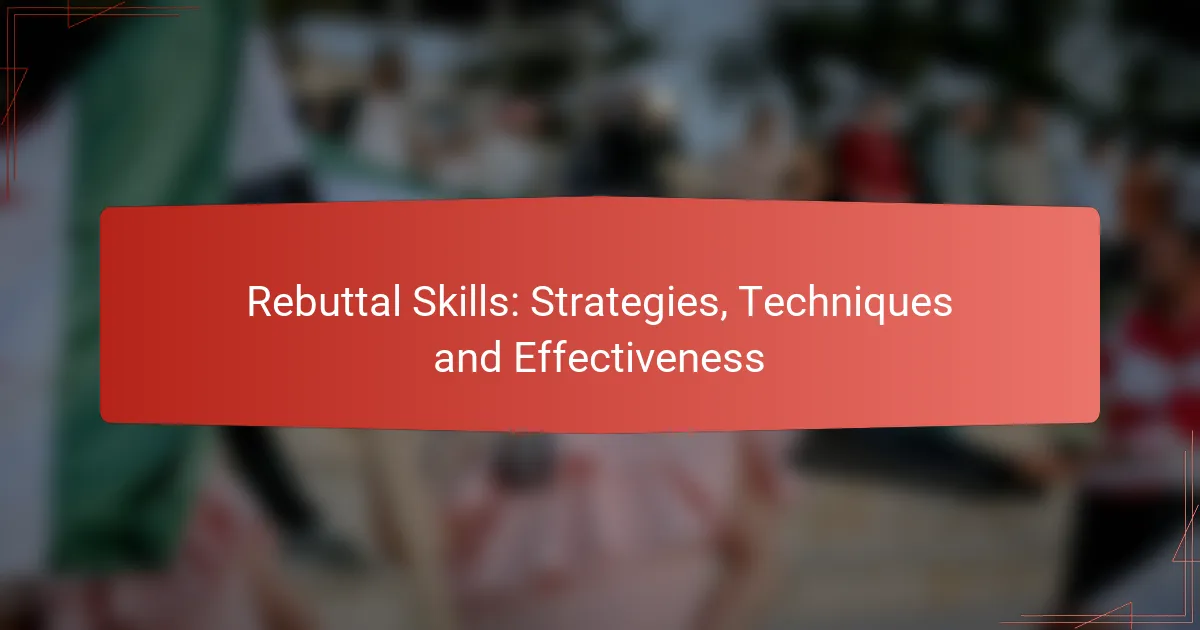Rebuttal skills are essential for effective communication, particularly in debates where countering opposing arguments is crucial. By mastering techniques such as active listening, structured argument formulation, and emotional intelligence, individuals can enhance their ability to respond persuasively. Implementing these strategies not only strengthens one’s position but also engages the audience more effectively.

What strategies improve rebuttal skills?
Improving rebuttal skills involves a combination of active listening, structured argument formulation, emotional intelligence, effective use of evidence, and practice. These strategies enable individuals to respond effectively and persuasively in discussions or debates.
Active listening techniques
Active listening is crucial for effective rebuttals, as it allows you to fully understand the opposing viewpoint before responding. Techniques include maintaining eye contact, nodding, and summarizing what the other person has said to confirm understanding.
By focusing on the speaker’s words and emotions, you can identify weaknesses in their argument and respond more effectively. Avoid interrupting and give the speaker time to express their thoughts completely.
Structured argument formulation
Structured argument formulation involves organizing your thoughts logically to present a clear rebuttal. Start with a strong thesis statement, followed by supporting points that counter the opposing argument.
Using a format like the claim-evidence-reasoning model can help clarify your position. Ensure each point is backed by relevant evidence and clearly linked to your main argument to enhance persuasiveness.
Emotional intelligence application
Emotional intelligence plays a significant role in rebuttal skills by helping you navigate the emotional landscape of discussions. Recognizing your own emotions and those of others can guide your responses and help maintain a constructive dialogue.
Practicing empathy allows you to address the emotional aspects of an argument, making your rebuttal more relatable and impactful. Be mindful of your tone and body language to foster a positive interaction.
Use of evidence and examples
Incorporating evidence and examples strengthens your rebuttal by providing concrete support for your claims. Use statistics, expert opinions, or real-life scenarios to illustrate your points and make them more compelling.
Ensure that your evidence is relevant and credible. Avoid overloading your argument with excessive data; instead, choose a few strong pieces of evidence that directly counter the opposing argument.
Practice through role-playing
Role-playing is an effective way to enhance rebuttal skills by simulating real-life discussions. Practicing with a partner allows you to experiment with different strategies and receive immediate feedback on your performance.
Set up scenarios that challenge your rebuttal abilities, and try to anticipate counterarguments. Regular practice can help you become more confident and articulate in your responses during actual debates.

How effective are rebuttal skills in debates?
Rebuttal skills are highly effective in debates as they allow participants to counter opposing arguments and strengthen their own positions. Mastering these skills can lead to more persuasive and impactful debates, enhancing overall communication effectiveness.
Increased persuasiveness
Rebuttal skills enhance persuasiveness by enabling debaters to directly address and dismantle opposing viewpoints. This not only demonstrates confidence but also reinforces the credibility of their own arguments. For instance, a debater who effectively counters a claim about economic policy can sway undecided audience members by providing clear, logical refutations.
To maximize persuasiveness, focus on the most compelling points of the opposition and prepare concise, factual rebuttals. Avoid emotional responses; instead, rely on data and logical reasoning to make your case stronger.
Enhanced critical thinking
Developing rebuttal skills fosters enhanced critical thinking as debaters must analyze arguments deeply and identify weaknesses. This process encourages a thorough understanding of both sides of an issue, leading to more informed and nuanced discussions. Engaging with opposing views can also reveal gaps in one’s own arguments, prompting necessary adjustments.
To improve critical thinking, practice identifying assumptions and logical fallacies in various arguments. Regularly engaging in debates or discussions can sharpen this skill, making it easier to formulate effective rebuttals in real-time.
Improved audience engagement
Effective rebuttal skills can significantly improve audience engagement during debates. When debaters actively respond to opposing arguments, it creates a dynamic exchange that keeps the audience interested and invested in the discussion. This interaction often leads to a more lively and memorable debate experience.
To enhance audience engagement, use rhetorical questions and direct addresses to involve listeners. Additionally, maintaining eye contact and using confident body language can further captivate the audience’s attention, making your rebuttals more impactful.

What techniques can enhance rebuttal effectiveness?
Enhancing rebuttal effectiveness involves employing strategies that clearly counter opposing arguments while engaging the audience. Key techniques include utilizing counterarguments, employing rhetorical questions, and adapting to audience feedback.
Utilizing counterarguments
Counterarguments are essential for a strong rebuttal as they demonstrate an understanding of opposing views. Presenting a well-structured counterargument not only highlights the weaknesses in the opposition’s stance but also reinforces your position.
When crafting counterarguments, identify the main points of the opposing argument and address them directly. For example, if arguing for renewable energy, acknowledge concerns about cost but provide data showing long-term savings and environmental benefits.
Employing rhetorical questions
Rhetorical questions can effectively challenge the audience’s assumptions and provoke critical thinking. By asking questions that highlight flaws in the opposing argument, you encourage your audience to reconsider their stance.
For instance, if discussing the benefits of public transportation, you might ask, “Isn’t it more efficient to reduce traffic congestion and pollution?” This approach not only engages listeners but also reinforces your argument without needing a direct answer.
Adapting to audience feedback
Being responsive to audience feedback is crucial for effective rebuttals. Observing reactions during a discussion allows you to adjust your approach, clarify points, or provide additional evidence as needed.
To adapt effectively, listen actively and watch for non-verbal cues. If your audience seems confused or skeptical, take a moment to address their concerns directly, perhaps by rephrasing your argument or providing a relevant example that resonates with their experiences.

What are the prerequisites for mastering rebuttal skills?
To master rebuttal skills, one must possess a solid understanding of the topic at hand and the ability to critically analyze opposing viewpoints. These foundational elements enable effective argumentation and strengthen one’s ability to respond persuasively.
Understanding the topic thoroughly
A deep comprehension of the subject matter is essential for crafting effective rebuttals. This involves not only knowing the facts and figures but also grasping the underlying principles and theories that govern the topic. Familiarity with key concepts allows for more nuanced arguments and counterarguments.
To enhance understanding, consider creating a mind map or outline of the topic. This can help visualize connections between ideas and identify areas that may require further research. Engaging with diverse sources, such as academic articles, books, and expert opinions, can also deepen knowledge and provide varied perspectives.
Researching opposing viewpoints
Researching opposing viewpoints is crucial for developing strong rebuttal skills. Understanding the arguments against your position allows you to anticipate objections and prepare effective counterarguments. This process involves examining credible sources that represent differing perspectives.
When researching, focus on the strongest arguments from the opposition. Take notes on their main points and any evidence they present. This will not only help in formulating rebuttals but also in identifying any weaknesses or logical fallacies in their arguments. A useful strategy is to categorize these viewpoints into themes, making it easier to address them systematically during discussions or debates.

How do cultural differences impact rebuttal strategies?
Cultural differences significantly influence rebuttal strategies by shaping how individuals communicate and respond to opposing views. Understanding these variations is crucial for effective interaction, as they can affect the tone, style, and content of rebuttals.
Variations in communication styles
Communication styles can vary widely across cultures, affecting how rebuttals are framed and delivered. For instance, some cultures may favor direct confrontation, while others prefer a more indirect approach to maintain harmony. Recognizing these differences can help tailor responses that resonate better with the audience.
In cultures with high-context communication, such as Japan or China, nuances and implied meanings play a significant role. In contrast, low-context cultures like the United States or Germany may prioritize clarity and straightforwardness. Adjusting your rebuttal style to match the cultural context can enhance its effectiveness.
Influence of social norms
Social norms dictate acceptable behavior in various cultures, influencing how rebuttals are perceived. For example, in collectivist societies, group consensus may be valued over individual opinions, making aggressive rebuttals less effective. Conversely, in individualistic cultures, assertiveness may be appreciated and even expected.
Understanding the social norms of your audience can guide your approach. For instance, in cultures that emphasize respect for authority, it may be more effective to frame rebuttals in a way that acknowledges differing viewpoints before presenting counterarguments. This strategy can foster a more constructive dialogue and minimize resistance.



